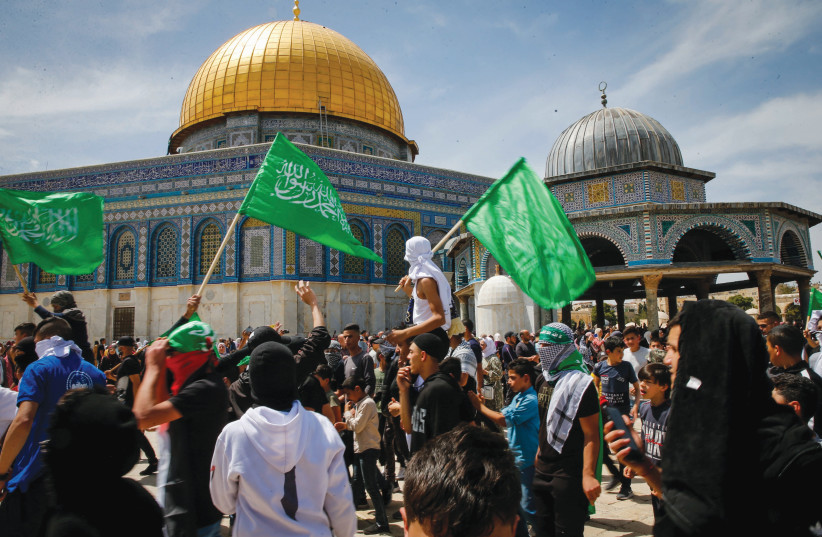Two weeks until Ramadan, and the concern over fermenting unrest due to intentions to limit the ascent of Israeli Arabs to the Temple Mount is preoccupying security authorities in the Israel Police, IDF and the Shin Bet. Attempts to stir up trouble every Friday since the outbreak of the war have not been particularly successful and apart from the occasional tension in east Jerusalem between Arabs and Israel Police, relative calm is maintained.
The procrastination in decision-making regarding restrictions on Muslim worshippers ascending to the Temple Mount until the last minute has become a consistent pattern among decision-makers in recent years, including Prime Minister Benjamin Netanyahu at the forefront. Last year, against the backdrop of an escalation in the area due to Palestinian terrorism, the security cabinet was required to decide whether to allow the entry of Palestinians from the West Bank to the Temple Mount.
Ultimately, a day before the beginning of Ramadan, approval was given, and thousands of Palestinians were allowed to enter through the security crossings around Jerusalem for prayers on the Temple Mount, on the recommendation of security officials that this would lead to a calming of the situation.

These riots were extensively covered in the Arab world, but after a few days, calm was restored in the Temple Mount area with the arrest and removal of the rioters. Meanwhile, the police maintain a thunderous silence regarding the expected scenarios this month, as well as the recommendations presented in security meetings, mainly, various restrictions aimed specifically towards some of the Arab citizens of Israel.
The focus on these restriction proposals has pushed aside an issue no less burning and sensitive, which is whether this year Palestinians from the West Bank will be allowed to enter the Temple Mount, after half a year since the attacks of October 7, and the nearly hermetic closure of the entry of Palestinian workers across the Green Line. The IDF and the Shin Bet will have to decide on this matter, as opposition to it is broader than security reasons, given the massacres that took place in the Gaza border region.
<br>Police must make Temple Mount decision
While operational preparations for the month of Ramadan are nearing completion, with the deployment of thousands of police officers and the reinforcement of security rings around the Old City and the Temple Mount, there are those who warn Police Commissioner Kobi Shabtai of unrest in the area if the organization does not clarify how the police will operate this month and whether there will be restrictions on Muslim worshippers ascending the Mount.
"We warn against an escalation that may erupt due to irresponsible conduct, both on the ground and in racist or Islamophobic statements. The police must act to calm the situation," demanded the non-governmental organization Abrahamic Initiatives. In a letter sent Wednesday to Shabtai, they stated, "We demand to establish clear instructions regarding the conduct of the police in Jerusalem towards the worshipers, and to convey these instructions to every officer on the ground. It must be emphasized that the right to worship is a fundamental right to which all citizens of the state are entitled, and it is the police's duty to enable this.
"If there is a legal decision to restrict prayer (for example in number, age, or gender) in a mosque, it is the responsibility of the police to publish clear information in advance to the public in order to prevent disappointment and frustration among believers who will arrive in Jerusalem but will be denied entry to the mosque," the organization wrote.
Before Shabtai stands a not-so-simple dilemma. On one hand, there is the adamant position of the responsible minister, National Security Minister Itamar Ben-Gvir, to impose restrictions on the ascent of Muslim worshippers to the Temple Mount. On the other hand, there are warnings from the IDF and the Shin Bet against an escalation, not just in Jerusalem, but across the country, alongside the police’s readiness in case riots break out. The scenes from the May, 2021 riots, and the anarchy that reigned under his command in the mixed cities, are something that Shabtai prefers to push away.
Now he will need to decide how the police’s position will be presented in the discussions over the next two weeks before the decision-makers. Israel Police stated, "We regret that, regarding a sensitive and complex issue which is being discussed in classified discussions at the political level and before any decisions have been made on the matter, there are parties expressing positions that are unclear what they are based on, and they have the potential to harm the process and excite the spirits. We emphasize that the Israel Police will present its official positions before the political echelons and not through the media, and will continue to do everything in its power to maintain the balance between freedom of worship and the peace and security of the public."
